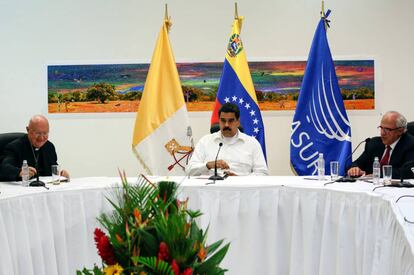Venezuela’s divided opposition sits down to talk with government
Leopoldo López’s hardline Popular Will refuses to attend Vatican-sponsored talks
Part of Venezuela’s opposition resumed talks with the government of President Nicolás Maduro on Sunday, with a recall referendum on his mandate topping their list of demands. Maduro shook hands with representatives of the opposition MUD roundtable, saying at the Vatican-sponsored dialogue in the Venezuelan capital of Caracas: “I am absolutely committed to these peace processes, I offer my hand to the MUD… We are prepared to listen to them.”

Alongside a Vatican special envoy at the talks were former Spanish Prime Minister José Luis Rodríguez Zapatero, as well as the former presidents of Panama and the Dominican Republic, Martín Torrijos and Lionel Fernández, respectively.
“No people can resolve their tensions through violence,” said Claudio María Celli, the Vatican’s representative.
Venezuela’s opposition say 17 years of socialism founded under former president Hugo Chávez have wrecked the oil-dependent nation’s economy and crushed democracy, while the government says a US-backed elite is seeking a violent coup.
The ultimate timing of the referendum is critical for the opposition
It is also demanding freedom for political prisoners, humanitarian aid amid an unprecedented economic downturn and respect for the decisions of the opposition-led National Assembly.
But the MUD is divided over the talks. Leopoldo López, one of the leading figures in the opposition, who is in prison, has told his Popular Will party not to attend. “We do not consider that the conditions for beginning a true dialogue have improved: there are more political prisoners in Venezuela than ever, and the regime has shown no sign of rectifying, particularly in relation to solving the crisis over lack of medicines,” said a party statement.
A further 14 opposition parties have also boycotted the talks with the Chavista government of President Maduro. Jesús Chuo Torrealba, the MUD’s general secretary, met with representatives of the opposition over the weekend to listen to their concerns.
Sunday’s meeting followed massive opposition marches last week, which led to scores of injuries and arrests plus the death of a policeman, and a partially successful national strike.
This week, the opposition is planning a march on the Miraflores presidential palace, drawing government accusations it wants to reprise the failed 2002 coup against Chávez.
The opposition wants humanitarian aid amid an unprecedented economic downturn
Maduro’s predecessor, who died of cancer after a 14-year rule, allowed and won a recall referendum in 2004.
But earlier in the month, Venezuela’s Supreme Court upheld a regional court’s decision postponing the next phase of a recall referendum following allegations of fraud during the collection process in four states, which prompted the National Electoral Commission (CNE) to likewise suspend last week’s signature collection drive.
The move could mean the MUD will have to restart the entire process in the four states where the fraud allegations surfaced. Such an outcome would be a major setback for the MUD, which has been aiming to organize the referendum before the end of the year. This goal has long been dismissed as unrealistic by the CNE, which announced last month that the plebiscite could be held no sooner than April of 2017.
The ultimate timing of the referendum is critical for the opposition.
If Maduro loses a vote before January 10, snap elections will be held, and his ruling socialists would face the prospect of losing the office of president for the first time in 14 years. The last time the right wing took power was during a short-lived coup in 2002.
However, if the referendum takes place after January 10, Maduro will simply be replaced by his vice-president until regular elections are held in 2018.
English version by Nick Lyne.
Tu suscripción se está usando en otro dispositivo
¿Quieres añadir otro usuario a tu suscripción?
Si continúas leyendo en este dispositivo, no se podrá leer en el otro.
FlechaTu suscripción se está usando en otro dispositivo y solo puedes acceder a EL PAÍS desde un dispositivo a la vez.
Si quieres compartir tu cuenta, cambia tu suscripción a la modalidad Premium, así podrás añadir otro usuario. Cada uno accederá con su propia cuenta de email, lo que os permitirá personalizar vuestra experiencia en EL PAÍS.
¿Tienes una suscripción de empresa? Accede aquí para contratar más cuentas.
En el caso de no saber quién está usando tu cuenta, te recomendamos cambiar tu contraseña aquí.
Si decides continuar compartiendo tu cuenta, este mensaje se mostrará en tu dispositivo y en el de la otra persona que está usando tu cuenta de forma indefinida, afectando a tu experiencia de lectura. Puedes consultar aquí los términos y condiciones de la suscripción digital.









































